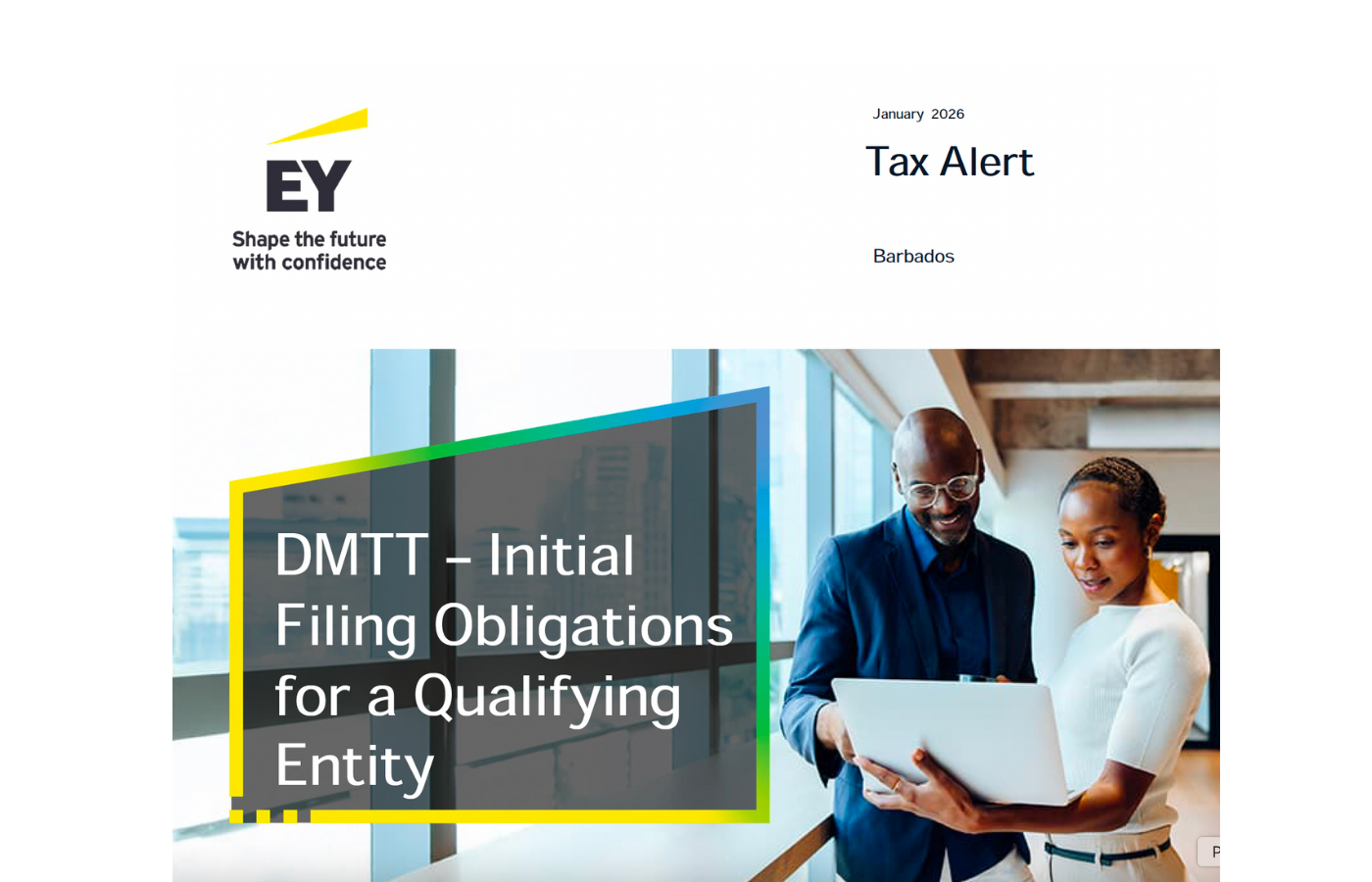-66.avif)
Following the Ministerial Statement delivered by the Honourable Mia Amor Mottley on 7 November 2023, regarding Pillar 2 (and associated) legislation, the relevant legislation has been approved by both the House of Assembly and the Senate, and assented by the President.
The Deloitte Barbados Tax & Legal team have shared the following Tax Alert Follow Up:
Domestic Corporate Tax Rate
A new corporate income tax rate of 9% has been established, effective 1 January, 2024 (pursuant to subsection 43(12) of the Income Tax (Amendment) Act). This applies to all corporations except for:
- Small Businesses: Companies earning less than BBD 2 million and registered under the Small Business Development Act will be subject to a 5.5% rate.
- Licensed Insurance Companies: Classes I, II, and III will maintain their current tax rates
- International Shipping: Companies in this industry will continue under the 2019 tax regime (5.5% - 1% sliding scale) due to exclusion from current GloBE rules. This will be reviewed for calendar year 2025 onwards.
- MNE Groups: In-scope Multinational Enterprise (MNE) groups with an Ultimate Parent Entity (UPE) or Intermediate Parent Entity (IPE) located in a jurisdiction that hasn't adopted the Income Inclusion Rule (IIR) or Undertaxed Profits Rule (UTPR) will remain under the 2019 tax regime (5.5% - 1% sliding scale) with no Qualified Domestic Minimum Top-up Tax (QDMTT) for Fiscal Year 2024 ONLY (defined as any income year commencing before January 1, 2024).
Domestic Top-Up Tax
A Qualified Domestic Minimum Top-up Tax of 15% will be applied to in-scope MNE groups with income subject to IIR or UTPR, starting from fiscal years commencing on or after 1 January, 2024. However, for Fiscal Year 2024 only, a top-up tax will apply solely if the Barbados Group's income is subject to IIR or UTPR in another jurisdiction.
Given the complexity of the legislation, Deloitte strongly recommends that MNE groups with global consolidated revenues exceeding EUR 750 million carefully review the following definitions within the Corporation Top-Up Tax Act:
- DMTT Group
- MNE group
- Top-up tax
- Ultimate Parent Entity
There have been several questions around the application of DMTT on various structures. Deloitte outlines examples below that were presented at BRA’s Global Tax Update, specific to Barbados:
Example 1:

Example 2:

Example 3:

N.B. the above does not take into consideration any potential covered taxes that can be used to minimize the top-up tax exposure at the Barbados level.
Corporation Tax Prepayments
- Effective January 1, 2024: In-scope Multinational Enterprise (MNE) groups will transition to monthly prepayments of corporate income tax. The prepayment amount should be calculated using the prior year's tax base multiplied by the new applicable tax rate.
- Effective January 1, 2025: All companies, except registered small businesses, will be subject to monthly prepayments of corporate income tax.
The Barbados Revenue Authority (BRA) previously circulated a Policy Note outlining the filing process for these required prepayments.
Tax Losses and Group Relief
- Tax Loss Carry-Forward: Beginning with Income Year 2025, the carry-forward period for tax losses will be reduced to five years (previously seven years).
- Group Relief Reintroduction: Barbados is re-introducing group relief provisions. This allows companies within the same qualifying group to offset current trading losses against the profits of another group member, reducing the overall tax liability.
- To qualify for group relief, both companies must be:
- Resident in Barbados for tax purposes
- Either a 75% subsidiary of each other or both 75% subsidiaries of a third company
- Group relief will be available:
- From Income Year 2024 for companies with existing trading losses exceeding BBD 100 million.
- From Income Year 2025 for all other companies.
- Specific exemptions for group relief usage are outlined in Section 23W of the Income Tax Act.
- To qualify for group relief, both companies must be:
- Tax Loss Limitation: The maximum tax benefit from losses remains at 50%. This means a corporation's tax payable cannot be reduced below 50% of its taxable income.
For further details, please refer to pages 9 to 18 of the Income Tax Amendment Act.
Other Inclusions
Patent Box Regime: This new regime offers a reduced corporate tax rate of 4.5% for income derived from qualified intellectual property.
- Please refer to pages 4 to 8 and 20 of the Income Tax Amendment Act for the applicable provisions.
Qualifying Refundable Tax Credits: Confirmation of existing qualifying refundable tax credits, including the Qualified Jobs Credit and the Research and Development credit for relevant sectors.
- After the previous Deloitte tax alert, the Qualified Jobs Credit was updated to reduce the refundable tax credit to a range of 50 and 100% (originally between 75% and 475%).
- Refer to pages 23 to 32 of the Income Tax Amendment Act for details.
Practice Considerations
The Barbados Revenue Authority (BRA) will be responsible for enforcing this legislation. Deloitte anticipates the BRA will issue additional policy notes to the public outlining the calculation and enforcement procedures for these new provisions.
Contact Deloitte
If you have determined that your entity is impacted as a result of this tax reform, please reach out to any of the contacts below, or your direct Deloitte tax contact(s), if you have any queries related to Barbados’ approach to Pillar Two.
Ikins D Clarke
Partner | Tax & Legal
1 (246) 620 6421 | idclarke@deloitte.com
Tara Collymore-Kirton
Director | Tax & Legal
1 (246) 620 6447 | tcollymore-kirton@deloitte.com
Chris Sulaiman
Senior Manager | Tax & Legal
1 (246) 620 6491 | csulaiman@deloitte.com
Nadia Payne
Manager | Tax & Legal
1 (246) 620 6417 | napayne@deloitte.com
Lana Sealy
Assistant Manager | Tax & Legal
1 (246) 620 6436 | lsealy@deloitte.com










-4.avif)
-3.avif)
-60.avif)


-35.avif)
-31.avif)
-29.avif)
.avif)
%20(1400%20%C3%97%20900%20px).avif)
-20.avif)










